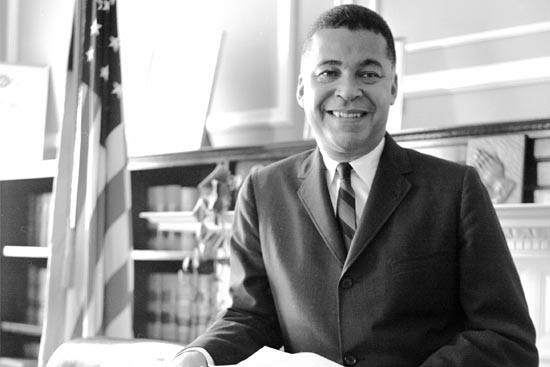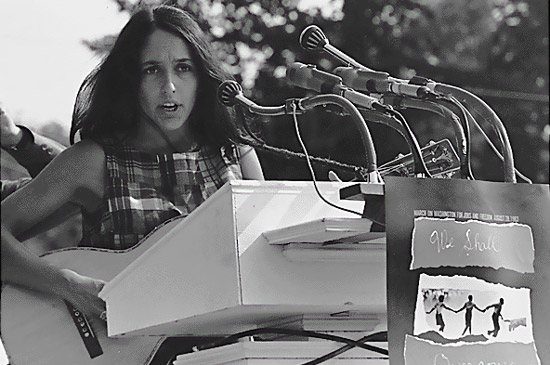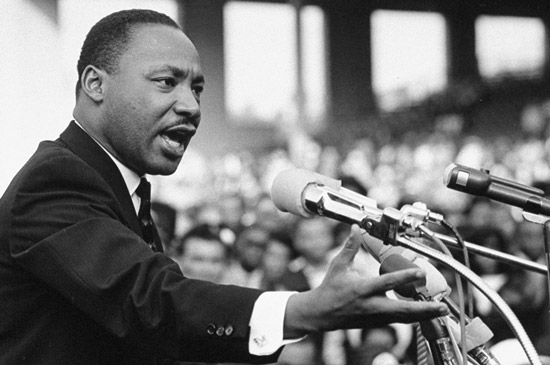BU Policies Protecting Free Speech to Get Fresh Look
As rhetoric nationwide intensifies, President Brown requests reviews and reports by fall

“Dissent and protest are essential ingredients in the democratic concoction. Without them an open society becomes a contradiction in terms, and representative government becomes as stagnant as despotism.” —Edward Brooke
In 1966, Edward Brooke (LAW’48,’50, Hon.’68) became the first African American popularly elected to the US Senate. Photo by BU Photography
Almost one-fifth of American undergraduates endorse violence to silence a campus speaker “known for making offensive and hurtful statements,” a 2017 survey found. Some have practiced what they preach.
A melee at Middlebury College in 2017 sent a professor to the hospital after she and scholar Charles Murray, who has argued that there are IQ differences between races, had been shouted off a stage and tried to weave their way through a gauntlet of protesters. The professor had participated in Murray’s talk to critically interrogate him about his views.
Mindful of the contentious political landscape on campuses and off, and sensing a potential threat to freedom of expression, Robert A. Brown, BU president, is creating two committees to review and possibly revise the University’s protocols protecting speech.
“Freedom of expression is a foundational guiding principle for an enduring democracy; it is both a check on power and a means to foster robust discourse,” Brown wrote in an email going out campus-wide. “American higher education has benefited profoundly from strong constitutional protections that have provided our campuses with unmatched scope for intellectual inquiry and an environment where ideas can be tested and sharpened in an atmosphere of serious but collegial debate.”
A Free Speech Policy Committee will draft a statement “that describes and affirms the University’s commitment to free speech,” Brown wrote. Jean Morrison, University provost, and Erika Geetter, vice president, general counsel, and secretary of the BU Board of Trustees, will chair the committee. Simultaneously, a Free Speech Operations Committee, chaired by associate general counsel Rebecca Ginzburg (School of Law’04) and Kenneth Elmore (Wheelock’87), associate provost and dean of students, will explore revisions to existing policies.

“Let the Ann Coulters of the world have their say. Trying to stop Ann Coulter or Milo Yiannopoulos from speaking or any group from marching will not stop the advance of fascism, but rather might strengthen it.”—Joan Baez
Joan Baez playing at the March on Washington in August 1963.
The committees will work through the early fall, when they’ll submit reports for approval by the University Council (professors and administrators who recommend action on academic matters) and the Administrative Council (which considers administrative policies).
But in polarized times, Brown wrote in his email: “The commitment to free speech is tested. As we observe events both on campuses and in the broader society, I believe it is reasonable to suggest we are in such a time.”
Morrison adds that BU has “a variety of independent operational policies” regarding expression, including in the BU Lifebook. Under “Tolerance and Religion,” the publication says the University “encourages the free exchange of beliefs and ideas and the reexamination of one’s values and commitments. With this freedom, however, comes the responsibility to respect the rights of others, including the right not to be harassed or pressured to join a religious group or take part in its activities.”
“But,” says Morrison, “we are overdue for a comprehensive, University-wide conversation about free speech and its manifestation in daily life on our campuses.”
One reason: that troubling student survey was not the lone example of First Amendment–challenged students and administrators making headlines. Last year, feminism critic Christina Hoff Sommers’ speech at Oregon’s Lewis & Clark Law School was repeatedly interrupted by protesters.

“If I lived in China or even Russia, or any totalitarian country, maybe I could understand some of these illegal injunctions….But somewhere I read of freedom of association. Somewhere I read of the freedom of speech.”—Rev. Martin Luther King, Jr.
Rev. Martin Luther King, Jr. (GRS’55, Hon.’59) giving a speech during the 1963 March on Washington.
Meanwhile, events off campus have cost some professors their jobs, as when New Jersey’s Essex County College fired an adjunct who had ridiculed, on Tucker Carlson’s Fox News TV show, whites objecting to a Memorial Day event for African Americans only. The University of Tampa fired a professor who called Hurricane Harvey “instant karma” for Republican-voting Texans.
Today’s battles over speech recall another contentious time: just over half a century ago, when BU’s most celebrated alumnus raised his voice in defense of freedom of expression.
In 1968, on the night before his murder, Martin Luther King, Jr. (GRS’55, Hon.’59) decried court injunctions on the Memphis sanitation strike he was in the city to support: “If I lived in China or even Russia, or any totalitarian country, maybe I could understand some of these illegal injunctions….But somewhere I read of freedom of association. Somewhere I read of the freedom of speech.”
As for violence being used to squelch those freedoms of civil rights protesters, King, who’d been assaulted numerous times for his activism, said, “We aren’t going to let dogs or water hoses turn us around.”

Comments & Discussion
Boston University moderates comments to facilitate an informed, substantive, civil conversation. Abusive, profane, self-promotional, misleading, incoherent or off-topic comments will be rejected. Moderators are staffed during regular business hours (EST) and can only accept comments written in English. Statistics or facts must include a citation or a link to the citation.